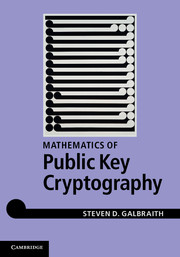
-
Select format
-
- Publisher:
- Cambridge University Press
- Publication date:
- 05 June 2012
- 15 March 2012
- ISBN:
- 9781139012843
- 9781107013926
- Dimensions:
- (247 x 174 mm)
- Weight & Pages:
- 1.28kg, 630 Pages
- Dimensions:
- Weight & Pages:
You may already have access via personal or institutional login
Book description
Public key cryptography is a major interdisciplinary subject with many real-world applications, such as digital signatures. A strong background in the mathematics underlying public key cryptography is essential for a deep understanding of the subject, and this book provides exactly that for students and researchers in mathematics, computer science and electrical engineering. Carefully written to communicate the major ideas and techniques of public key cryptography to a wide readership, this text is enlivened throughout with historical remarks and insightful perspectives on the development of the subject. Numerous examples, proofs and exercises make it suitable as a textbook for an advanced course, as well as for self-study. For more experienced researchers it serves as a convenient reference for many important topics: the Pollard algorithms, Maurer reduction, isogenies, algebraic tori, hyperelliptic curves and many more.
Reviews
‘… the book gathers the main mathematical topics related to public key cryptography and provides an excellent source of information for both students and researchers interested in the field.’
Juan Tena Ayuso Source: Zentralblatt MATH
Contents
Metrics
Altmetric attention score
Full text views
Full text views help Loading metrics...
Loading metrics...
* Views captured on Cambridge Core between #date#. This data will be updated every 24 hours.
Usage data cannot currently be displayed.
Accessibility standard: Unknown
Why this information is here
This section outlines the accessibility features of this content - including support for screen readers, full keyboard navigation and high-contrast display options. This may not be relevant for you.
Accessibility Information
Accessibility compliance for the PDF of this book is currently unknown and may be updated in the future.


